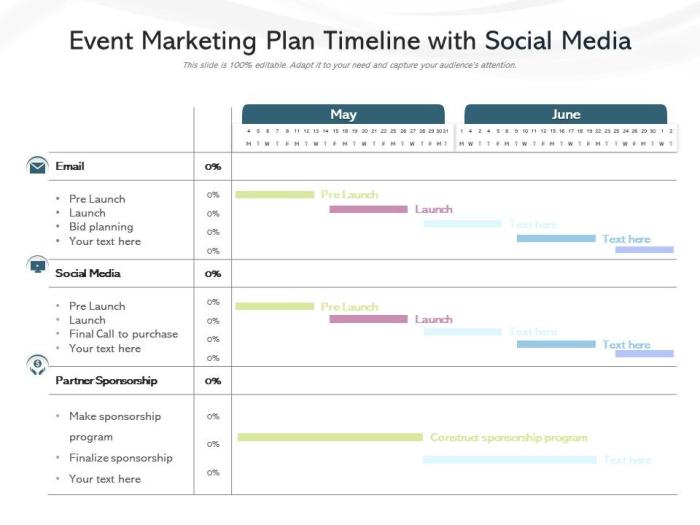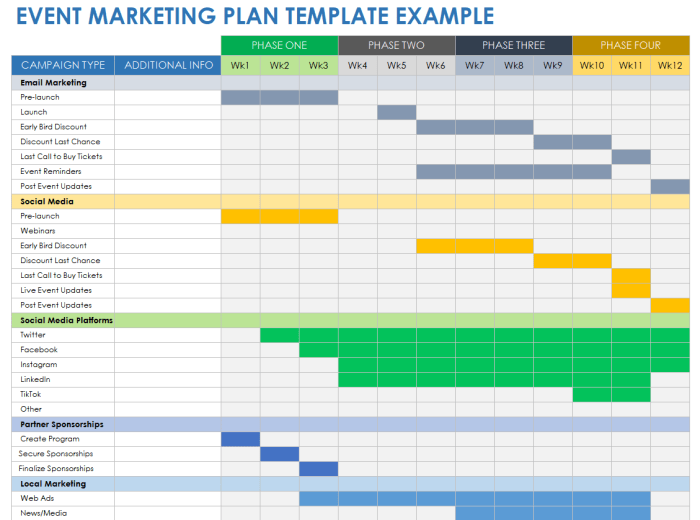Developing an Event Marketing Plan dives into the key strategies needed to make your event stand out in a crowded space. From boosting attendance to maximizing engagement, this guide has got you covered.
Get ready to learn about the essential components, innovative marketing approaches, and the powerful impact of technology on event promotion.
Importance of Developing an Event Marketing Plan
Creating a well-thought-out event marketing plan is absolutely essential for the success of any event. Without a solid strategy in place, it becomes challenging to attract attendees, generate buzz, and achieve desired outcomes.
Influence on Attendance
- A well-executed marketing plan can significantly boost attendance by reaching a wider audience through targeted promotional efforts.
- Utilizing social media, email campaigns, and partnerships with influencers can help drive more people to register and participate in the event.
Impact on Engagement
- Effective marketing strategies can enhance engagement levels by creating excitement and anticipation leading up to the event.
- Engaging content, interactive elements, and personalized communication can foster a sense of connection with the audience, encouraging active participation.
Overall Event Outcomes
- A comprehensive marketing plan can ultimately determine the success of the event by influencing key metrics such as ticket sales, sponsorships, and overall ROI.
- By aligning marketing efforts with specific goals and objectives, event organizers can maximize the impact and achieve desired results.
Successful events like Coachella, SXSW, and Comic-Con have demonstrated the power of a well-crafted marketing plan in driving massive attendance, creating a buzz, and delivering unforgettable experiences for attendees.
Components of an Event Marketing Plan: Developing An Event Marketing Plan
Developing a successful event marketing plan requires careful consideration of various essential elements to ensure the event’s success.
Identifying Target Audiences
To identify target audiences, it is crucial to conduct market research to understand the demographics, preferences, and behaviors of potential attendees. Tailoring marketing strategies to reach them effectively involves creating personalized messaging and content that resonates with their interests and needs. Utilizing social media analytics, surveys, and feedback can help in refining the target audience and optimizing marketing efforts.
Budgeting
Budgeting plays a crucial role in an event marketing plan as it determines the resources available for promotional activities. Allocating funds strategically across different marketing channels such as digital advertising, influencer partnerships, and offline promotions can maximize the reach and impact of the event. Setting clear financial goals and monitoring expenses throughout the planning process is essential to stay within budget and achieve a positive return on investment.
Timelines
Creating a detailed timeline is essential to ensure that all marketing activities are executed in a timely manner leading up to the event. Establishing deadlines for tasks such as content creation, campaign launches, and follow-ups helps in maintaining progress and avoiding last-minute rushes. By setting milestones and tracking progress against the timeline, event organizers can stay organized and on track to meet their marketing objectives.
Promotional Channels, Developing an Event Marketing Plan
Choosing the right promotional channels is critical to reaching the target audience effectively. Utilizing a mix of online and offline channels such as social media, email marketing, public relations, and partnerships can help in maximizing visibility and engagement. By analyzing past marketing performance and audience preferences, event marketers can identify the most effective channels for promoting their event and allocate resources accordingly.
Developing Marketing Objectives and Strategies

Setting clear and measurable marketing objectives is crucial for the success of any event. These objectives provide a roadmap for your marketing efforts and help you track progress towards your goals.
Setting Clear and Measurable Marketing Objectives
- Define specific goals: Whether it’s increasing ticket sales, boosting brand awareness, or engaging with a new audience, your objectives should be specific and measurable.
- Establish key performance indicators (KPIs): Identify metrics that will indicate whether you’ve achieved your objectives, such as website traffic, social media engagement, or lead generation.
- Set a timeline: Determine deadlines for reaching your objectives to keep your team focused and accountable.
- Regularly evaluate and adjust: Monitor your progress towards your objectives and be prepared to make adjustments to your marketing strategies if needed.
Marketing Strategies for Promoting Events
- Social media campaigns: Utilize platforms like Instagram, Facebook, and Twitter to create buzz, engage with your audience, and drive ticket sales.
- Influencer partnerships: Collaborate with influencers or industry experts to reach a larger audience and increase credibility and trust among your target market.
- Email marketing: Build an email list and send targeted campaigns to promote your event, share updates, and encourage ticket purchases.
Examples of Creative Marketing Approaches
- Flash sales and limited-time offers: Create urgency and incentivize early ticket purchases with exclusive discounts or perks for a limited time.
- Viral challenges or contests: Engage your audience by creating fun challenges or contests related to your event, encouraging participation and social sharing.
- Interactive experiences: Offer interactive elements like virtual tours, live Q&A sessions, or behind-the-scenes sneak peeks to build excitement and engagement.
Utilizing Technology in Event Marketing

Technology plays a crucial role in modern event marketing plans, providing innovative ways to reach and engage with target audiences. Utilizing tools such as event management software, data analytics, and virtual event platforms can significantly enhance marketing efforts by streamlining processes, gaining valuable insights, and creating interactive experiences for attendees.
Event Management Software
Event management software is a powerful tool that helps organizers plan, execute, and evaluate events more efficiently. It enables seamless registration, ticketing, and communication with attendees, as well as tracking key metrics to measure success. By automating tasks and workflows, event management software saves time and resources, allowing organizers to focus on creating memorable experiences.
Data Analytics
Data analytics allows event marketers to analyze attendee behavior, preferences, and engagement patterns to optimize marketing strategies and improve event ROI. By collecting and interpreting data from various sources, such as registration forms, social media interactions, and website traffic, marketers can make data-driven decisions to enhance the overall event experience and drive better results.
Virtual Event Platforms
Virtual event platforms have become increasingly popular, especially in light of recent global events that have limited in-person gatherings. These platforms offer a range of features, such as virtual networking, live streaming, and interactive sessions, to create immersive online experiences for attendees. By leveraging virtual event platforms, marketers can reach a wider audience, reduce costs, and adapt to changing circumstances more effectively.
Social Media, Mobile Apps, and Online Advertising
Social media, mobile apps, and online advertising are essential tools for promoting events and engaging with audiences before, during, and after the event. By leveraging social media platforms like Facebook, Instagram, and LinkedIn, marketers can create targeted campaigns, build excitement, and encourage social sharing. Mobile apps provide attendees with convenient access to event information, schedules, and networking opportunities, enhancing the overall event experience. Online advertising, including display ads, search engine marketing, and retargeting campaigns, can help increase event visibility and drive ticket sales.
